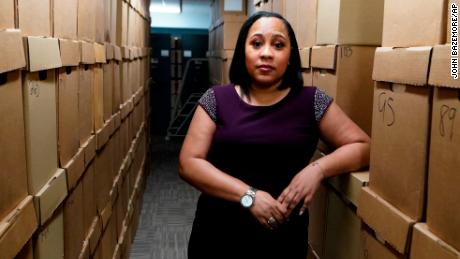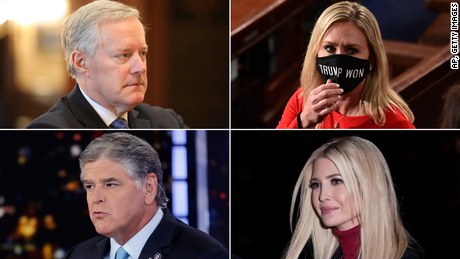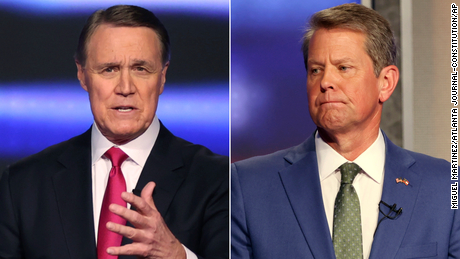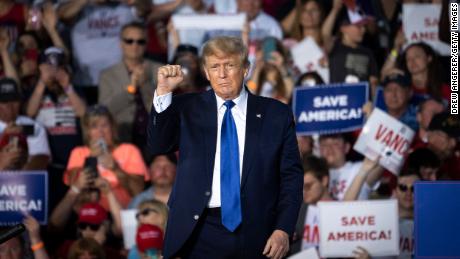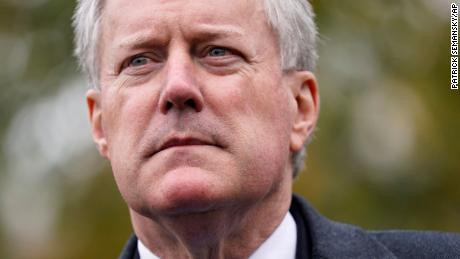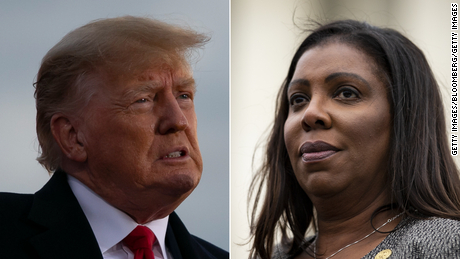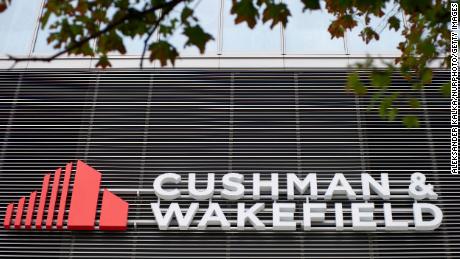“Need to end this call,” Jordan Fuchs, then the deputy secretary of state, said in a text message to then-White House chief of staff Mark Meadows. “I don’t think this will be productive much longer.”
She added: “Let’s save the relationship.”
The little-noticed text messages, included in a recent court filing, provide a deeper look at the chaos that ensued as the former President pressed Raffensperger to help prove Trump won in Georgia — a state Trump lost. That call now stands at the center of an investigation into Trump, which is set to advance this week when Atlanta-area prosecutors convene a special grand jury to determine whether any of Trump’s actions related to Georgia’s election — or those of his allies — were criminal.
Meadows eventually did wrap up that tense call back in January 2021, suggesting lawyers from both sides should connect again soon.
“Thank you,” Fuchs said. “Wow.”
Fuchs declined to comment.
Fulton County District Attorney Fani Willis has been digging into Trump’s calls with Raffensperger and another official in the Secretary of State’s office; presentations former Trump lawyer Rudy Giuliani made before state lawmakers that were riddled with election falsehoods; a phone call between South Carolina Sen. Lindsey Graham and Raffensperger; and the sudden departure of Byung “BJay” Pak, the US attorney for the Northern District of Georgia.
Willis is poised to seat the grand jury in the middle of a hotly contested Republican primary season in Georgia. She has said she will delay calling witnesses — several of whom are on the ballot — to avoid interfering with the primary. Meantime, as former Republican Sen. David Perdue challenges Gov. Brian Kemp in the GOP gubernatorial primary, new evidence is emerging about Perdue’s efforts to backchannel with Georgia officials about the 2020 election results.
For Willis, her probe has been playing out against a backdrop of racist threats that began the moment she announced an investigation into Trump. For Monday’s jury selection, officials are planning to close roads surrounding the courthouse, station snipers on the roof and have K-9 police dogs at the ready, according to people involved in the planning. Prosecutors on Willis’ team have also been issued bulletproof vests, said a person familiar with the situation.
The sweeping investigation has sought to determine not only whether Trump committed crimes but also whether there was a broader criminal conspiracy playing out in the efforts to overturn Georgia’s election results. In document preservation requests to Georgia officials in February 2021, Willis said she was investigating potential crimes including solicitation of election fraud, making false statements to government bodies, conspiracy, racketeering, violation of oath of office and violence or threats related to election administration.
Over the past 15 months, investigators in Georgia have interviewed more than 50 witnesses, with plans to subpoena at least 30 others, Willis told the Atlanta Journal Constitution and a source familiar with the probe confirmed to CNN. Once the special grand jury is empaneled, prosecutors will be able to subpoena witnesses that may include some of Trump’s closest associates.
“I imagine that we’re going to be issuing subpoenas to a lot of people, and that all of them are not going to welcome our invitation to come speak with us,” Willis told CNN in February.
A special grand jury does not issue indictments, but it possesses broader investigative powers than a typical grand jury in the state as well as the power to issue subpoenas for witness testimony, phone, email and other records. If the special grand jury recommends an indictment, Willis could then seek one from the other grand juries regularly empaneled in Fulton County.
The Georgia investigation is playing out as the House select committee has already collected a mountain of information, including some relating to the Trump team’s efforts in Georgia. The House select committee and Willis’ team have already been in contact about ways to share information, according to sources familiar with the situation, although it’s still unclear if she has access to material like Meadows’ texts. Some of that information could bolster Willis’ efforts or even open new avenues of investigation.
“Any relevant information no matter where it comes from will be reviewed and part of the investigation,” said Jeff DiSantis, a spokesman for the Fulton County district attorney’s office.
Text messages from Meadows show Perdue’s efforts to help Trump
Perdue jumped into the governor’s race last year after Trump — still livid over Kemp’s role in certifying the 2020 election — went hunting for a Republican to challenge the incumbent governor. Earlier that year, Perdue had lost his US Senate seat in a runoff election against Democrat Jon Ossoff. It was a loss many Republicans blamed on Trump, complaining Trump’s constant election fraud claims had depressed the GOP vote.
Now that he’s running as the Trump-backed candidate, Perdue has fully embraced baseless election fraud claims, opening an April debate against Kemp by saying, “folks, let me be very clear tonight, the election in 2020 was rigged and stolen.”
Previously unreported text messages which were obtained by CNN and are among those Meadows selectively provided to the House select committee investigating Jan. 6, reveal Perdue also played a role in working to sway Georgia officials last year while he was preparing for his runoff fight.
Georgia Attorney General Chris “Carr won’t be any help with SOS,” Perdue wrote to Meadows on December 13, 2020. “I have a call into the Governor’s general counsel now to see if they might help.”
The text came days after Trump spoke to Carr and reportedly encouraged him not to rally Republicans against a lawsuit Trump allies filed with the Supreme Court to toss millions of votes from Georgia and other battleground states. In a response to the Supreme Court on December 10, Carr urged the justices to reject the Trump-backed lawsuit. (The court rejected the lawsuit the next day.)
Spokespeople for Carr and Kemp did not respond to requests for comment about the text messages.
In a separate exchange, Perdue texted Meadows on December 29, saying he was helping to arrange a call between Giuliani and top Republicans in the Georgia state legislature. “I’m trying to set up this call with state legislature leaders and Rudy,” Perdue texted. “I just want to make sure I’m doing what you and the president want.”
After Perdue sent a follow-up text confirming the roster of call of participants, Meadows responded, “Great.”
The following day, Giuliani appeared before a Georgia state Senate subcommittee spreading more lies and conspiracies about the 2020 election.
A spokeswoman for Perdue’s campaign declined to comment.
An attorney for Meadows did not respond to a request for comment.
Bob Costello, an attorney for Giuliani, declined to comment on the text messages and said his client has yet to hear from investigators in Georgia.
“No news is good news,” Costello said.
Long road ahead in Trump case
Willis told CNN in February that she expects some subpoenas to go out in May, followed by more in June. But she told the Atlanta Journal Constitution she doesn’t intend to call witnesses to testify until June 1, after Georgia’s May 24 primary.
A number of those potential witnesses — including Raffensperger, Carr and Kemp — are on the GOP primary ballot, facing off against a slate of election-deniers. All of them, in addition to Lt. Gov. Geoff Duncan who is not running for reelection, received document preservation requests last year. They are not expected to be targets of the probe, according to document preservation letters Willis sent last year.
“I would not request that anyone that was on the ballot come speak to me prior to May 24. I’ve run a campaign, I know how busy, crazy you are,” Willis told CNN in a February interview. “I think that you wouldn’t even be able to think clearly to really give us the type of interview I need. However, when we get past that point I can’t wait around until some election in November. I just can’t do that.”
Several staffers from the Secretary of State’s office participated in voluntary interviews with Willis’ team and Raffensperger previously told CNN he would share information if he received a subpoena. Carr and his staffers have not yet participated in interviews with investigators, according to his office. Spokespeople for Kemp and Duncan did not respond to questions.
Willis previously told CNN she hopes to decide whether or not to pursue charges by the end of 2022.
Michael J. Moore, the former US attorney for the Middle District of Georgia between 2010 and 2015 under President Barack Obama, said that Willis should expect a series of challenges from Trump’s legal team if she pushes ahead with subpoenas for his inner circle or, eventually, an indictment.
“There’s this big crescendo that has led up to this special grand jury, then everybody’s going to be waiting to see is there an indictment or is there a decision to charge,” Moore said. “If there’s an indictment, you’re going to have this ongoing legal battle about whether or not the state has the legal authority and jurisdiction to do it, whether or not the former President can be charged with this.”
Moore added: “At the end of the day I just think it’s unlikely that a former President ends up in the Georgia penitentiary system.”
For Trump’s part, people close to him said he hasn’t been particularly preoccupied by the Georgia investigation.
Willis has met with Trump’s attorneys on multiple occasions and has informed them she is moving ahead with her investigation. If Willis appears to be nearing an indictment, Trump’s attorneys have already asked Willis for an opportunity to present their case for why he should not face charges, according to a person familiar with the matter.
A Trump spokeswoman did not respond to a request for comment.
The threats that have ensued around this high-profile investigation have prompted officials to ramp up security as a pool of roughly 200 potential grand jurors arrive Monday. Eventually the group will be whittled down to roughly two dozen who will be chosen and are expected to meet weekly.
“We want to be in a space where we’re just overly prepared,” Fulton County Sheriff Patrick Labat, who has taken the lead on security protocols as the special grand jury gets underway, told CNN in an interview. “We’re rather have the resources and not need them, right? And given everything that took place on January 6th, we want to make sure that our community, our justice community, is as safe as possible.”
Willis also asked the FBI to provide security for buildings surrounding her office and the courthouse after Trump, appearing at a rally in Texas, called for his supporters to protest prosecutors in Atlanta, New York and Washington, DC.
“Our efforts are focused on gathering intelligence to identify any potential threats and sharing that information with our partners,” said Jenna Sellitto, public affairs specialist with the FBI in Atlanta. “If any potential threats develop, we will work with our partners as necessary.”
Willis previously told CNN the level of threats aimed at her team have ebbed and flowed, although they have been consistently racist in nature.
“I’ll tell your viewers and any other viewers: It does not offend me to call me Black. It just doesn’t. They’re wasting their time,” Willis said back in February. “However, they continue to send those very nasty messages. I’ve never been called the N-word so much in my life.”
Labat said Fulton County and its law enforcement partners are prepared to deal with high profile situations, comparing the preparations to getting ready for the Super Bowl or Atlanta’s Peachtree Road Race, which draws tens of thousands of runners and bills itself as the world’s largest 10-kilometer road race.
“This is a big show, but it’s not the biggest show the city and the country have ever seen,” Labat said of the Trump case in Georgia. “We’ll manage.”



